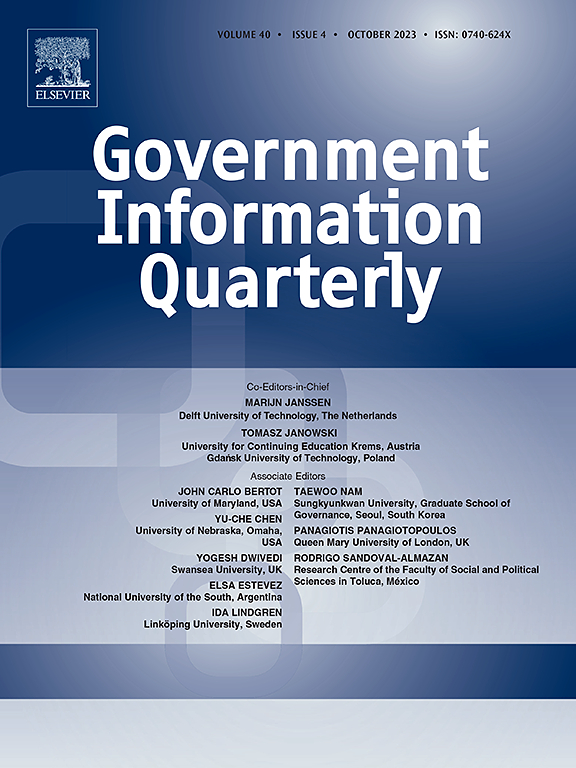自动化的讽刺及其对公共服务自动化的影响
IF 10
1区 管理学
Q1 INFORMATION SCIENCE & LIBRARY SCIENCE
引用次数: 0
摘要
据说,新兴技术能够实现以往被视为需要人力参与的任务的自动化,因此,公共服务提供的自动化再次受到关注。然而,这些自动化技术的优点往往被夸大了。我们需要更多关于公共服务自动化的知识,而且可以从研究人机交互的邻近研究领域学到很多东西。为了以点带面,本研究采用了 Bainbridge(1983 年)提出的 "自动化的讽刺 "概念。其目的是:(1)提出自动化的讽刺;(2)解释在公共服务环境中实施自动化系统时,这些讽刺如何发挥作用;(3)概述其对公共服务自动化的影响。为此,我们将自动化的讽刺与瑞典地方政府机器人流程自动化(RPA)发展的当代研究联系起来。通过分析,我们得出了五种具有讽刺意味的现象以及对公共服务自动化的一系列影响。这些对公共服务自动化的讽刺和启示引导人们关注未来自动化实施过程中必须承认的关键挑战,并表明需要进一步调查和理论发展,例如自动化带来的问题;自动化带来的任务、角色和责任;如何设计人类与自动化系统之间的界面,以促进监控、接管和维护;以及评估自动化系统影响和质量的工具和方法。因此,本文为未来的实证调查和公共服务自动化的进一步理论发展奠定了基础。本文章由计算机程序翻译,如有差异,请以英文原文为准。
Ironies of automation and their implications for public service automation
Automation of public service provision has gained renewed attention as emerging technologies are said to enable automation of tasks that were previously seen as requiring human involvement. However, the merits of these automation technologies are often exaggerated. More knowledge is needed on public service automation, and much can be learned from adjacent research fields studying human-automation interaction. To lead by example, this work applies Bainbridge's (1983) concept of ironies of automation. The purpose is to (1) present ironies of automation, (2) explicate how these ironies can come into play when implementing automated systems in the public service context, and (3) outline implications that follow for public service automation. This is achieved by relating ironies of automation to contemporary studies on Robotic Process Automation (RPA) developments in Swedish local government. The analysis results in five ironies and a set of implications for public service automation. The ironies and implications for public service automation direct attention to key challenges that must be acknowledged in future automation implementations and show that further investigations and theoretical developments are needed on e.g., problems introduced by automation; tasks, roles, and responsibilities that follow on automation; how to design the interface between humans and automated systems in a way that facilitates monitoring, take-over, and maintenance; and, tools and methods for assessing the impact and quality of automated systems. This paper thus provides a foundation for future empirical investigations and further theoretical development on public service automation.
求助全文
通过发布文献求助,成功后即可免费获取论文全文。
去求助
来源期刊

Government Information Quarterly
INFORMATION SCIENCE & LIBRARY SCIENCE-
CiteScore
15.70
自引率
16.70%
发文量
106
期刊介绍:
Government Information Quarterly (GIQ) delves into the convergence of policy, information technology, government, and the public. It explores the impact of policies on government information flows, the role of technology in innovative government services, and the dynamic between citizens and governing bodies in the digital age. GIQ serves as a premier journal, disseminating high-quality research and insights that bridge the realms of policy, information technology, government, and public engagement.
 求助内容:
求助内容: 应助结果提醒方式:
应助结果提醒方式:


